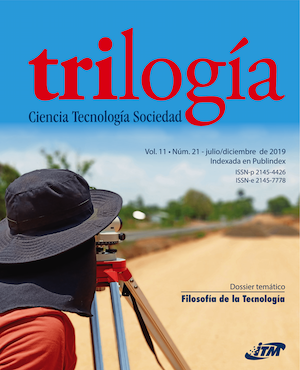La mejora humana como tema de estudio de la filosofía de la tecnología
Resumen
El texto explora algunos de los elementos centrales del denominado proyecto de la mejora humana a la luz de sus fundamentos epistemológicos, técnicos y antropológicos, a fin de construir un marco de interpretación que muestre cómo la filosofía de la tecnología es una herramienta valiosa para su análisis. El documento analiza definiciones y modalidades de la mejora humana, tanto desde la perspectiva de sus objetivos y alcances como desde la de sus límites y principales obstáculos, exponiendo cómo puede fortalecerse un análisis de tipo multidimensional, a partir del marco epistemológico de la filosofía de la tecnología.
Referencias bibliográficas
Agar, N. (2015). The Sceptical Optimist: Why Technology Isn’t the Answer to Everything. Oxford: Oxford University Press.
Annas, G. (2002). Cell Division. Boston Globe, 21, 97.
Anwar, M., Kim, S. & Choi, S. (2015). The triumph of chemically enhanced cellular reprogramming: a patent review. Expert Opinion on Therapeutic Patents, 26(2), 265-280. https://doi.org/10.1517/13543776.2016.1118058
Barnes, B. & Dolby, R. (1970). The Scientific Ethos: A deviant viewpoint. European Journal of Sociology,11(1), 3–25. https://doi.org/10.1017/S0003975600001934
Benjamin, G. (2016). The Cyborg Subject. Reality, Consciousness, Parallax. London: Palgrave-Macmillan UK.
Bostrom, N. & Sandberg, A. (2009). The Wisdom of Nature: An Evolutionary Heuristic for Human Enhancement. In J. Savulescu & N. Bostrom, Human Enhancement (pp. 375-416). New York: Oxford University Press.
Bostrom, N. (2004). Transhumanism: The World’s Most Dangerous Idea? Retrieved from https://nickbostrom.com/papers/dangerous.html
Bostrom, N. (2005). In Defense of Posthuman Dignity. Bioethics, 19(3), 202–214.
Bostrom, N. (2007). Technological Revolutions and the Problem of Prediction. In F. Allhoff, P. Lin, J. Moor & J.
Weckert (Eds.), Nanoethics: The Ethical and Social Implications of Nanotechnology (pp. 101-118). New Jersey: John Wiley & Sons.
Bostrom, N. (2009). The Future of Humanity. In: J. K. Berg Olsen, E. Selinger & S. Riis (Eds.), New Waves in Philosophy of Technology (pp. 186-215). London: Palgrave-Macmillan UK.
Cabrera, L. (2015). Rethinking Human Enhancement. Social Enhancement and Emergent Technologies. London: Palgrave-Macmillan.
Claverie, B., & Le Guyader, H. (2018). Approches éthiques des néotechnologies d’augmentation de l’humain. Ingénierie cognitique, 2(1). http://doi.org.10.21494/ISTE.OP.2018.0272
Dewey, J. (1927). The Public and its Problems. Athens, OH: Swallow Press.
Ebbesen, M. & Jensen, T. G. (2006). Nanomedicine: Techniques, potentials, and ethical implications. Journal of Biomedicine and Biotechnology, 2006, 1–11. http://dx.doi.org/10.1155/JBB/2006/51516
Ellul, J. (1964). The Technological Society. New York: Alfred A. Knopf, Inc.
Ellul, J. (1980). The Technological System. New York: Continuum Publishing Corp.
Fukuyama, F. (2002). Our Posthuman Future. New York: Farrar, Straus & Giroux.
Fukuyama, F. (2009). Transhumanism. Foreign Policy. Retrieved from https://foreignpolicy.com/2009/10/23/transhumanism/
Gehlen, A. (2003). A philosophical–anthropological perspective on technology. In R. Scharff & V. Dusek (Eds.), Philosophy of technology: The Technological Condition: An Anthology (pp. 213-220). Malden: Blackwell Publishing.
Gehlen, A. (1989). Man in the Age of Technology. New York: Columbia University Press.
Hildt, E., & Franke, A. (Eds.). (2013). Cognitive Enhancement. An Interdisciplinary Perspective. New York: Springer.
Hottois, G. (1996). Entre symboles et technosciences. Un itinéraire philosophique. Paris: Champ Vallon.
International Olympic Committee (IOC). (1991). Olympic Charter. Lausanne: IOC.
Straits Times. (2018). Gene-edited baby claim sparks outrage in China. Retrieved from https://www.straitstimes.com/asia/east-asia/gene-edited-baby-claim-sparks-outrage-in-china
Jonas, H. (1979). Toward a Philosophy of Technology. TheHastings Center Report, 9(1), 34-43. https://doi.org/10.2307/3561700
Juengst, E. & Moseley, D. (2019). Human Enhancement. Retrieved from https://plato.stanford.edu/entries/enhancement/
Knorr-Cetina, K. (1981). The Manufacture of Knowledge. Oxford: Pergamon Press.
Kourany, J. A. (2010). Philosophy of Science after Feminism. Oxford: Oxford University Press.
Kourany, J. A. (2013). Human Enhancement: Making the Debate More Productive. Erkenntnis, 79(S5), 981–998. https://doi.org/10.1007/s10670-013-9539-z
Kuhn, T. S. (1962). The Structure of Scientific Revolutions. Chicago: University of Chicago Press.Lakatos, I. (1970). Falsification and the Methodology of Scientific Research Programmes. In I. Lakatos & A. Musgrave (Eds.), Criticism and the Growth of Knowledge: Proceedings of the International Colloquium in the Philosophy of Science, London, 1965 (pp. 91-196). Cambridge: Cambridge University Press. https://doi.org/10.1017/CBO9781139171434.009
Lakatos, I. (1976). History of science and its rational reconstructions. In C. Howson (Ed.), Method and Appraisal in the Physical Sciences: The Critical Background to Modern Science, 1800–1905 (pp. 1-40). Cambridge: Cambridge University Press. https://doi.org/10.1017/CBO9780511760013.002
Lakhan, S. & Kirchgessner, A. (2012). Prescription stimulants in individuals with and without attention deficit hyperactivity disorder: misuse, cognitive impact, and adverse effects. Brain and Behavior, 2(5), 661–677. https://doi.org/10.1002/brb3.78
Latour, B. & Woolgar, S. (1979). Laboratory Life: The Social Construction of Scientific Facts. Beverly Hills & London: Sage Publications.
Latour, B. (1987). Science in Action: How to Follow Scientists and Engineers through Society. Cambridge: Harvard University Press.
Laudan, L. (1978). Progress and Its Problems. Towards a Theory of Scientific Growth. Berkeley: University of California Press.
McMullin, E. (1984). The Rational and the Social in the History of Science. In J. Brown (Ed.), Scientific Rationality: The Sociological Turn (pp. 127-163). Dordrecht: Springer Netherlands.
Martin, M. (Prod.). (2014). Meet the Cyborgs [Audio file]. Retrieved from https://www.bbc.co.uk/programmes/b08bzl96
Mesthene, E. (1967). Technology and Wisdom. In Mitcham and Mackey (Ed.), Philosophy and Technology. Readings in the philosophical problems of technology. New York: Free Press.
Nouvel, P. (2015). A Scale and a Paradigmatic Framework for Human Enhancement. In S. Bateman, S. Gayon, S. Allouche, J. Goffette & M. Marzano (Eds.), Inquiring into Human Enhancement. Interdisciplinary and International Perspectives (pp. 103-118). London: Palgrave Macmillan.
President’s Council on Bioethics. (2003). Beyond therapy: Biotechnology and the pursuit of happiness. A Report by the President’s Council on Bioethics. Retrieved from http://bioethics.georgetown.edu/pcbe/reports/beyondtherapy
Redeker, R. (2014). Egobody. La fábrica del hombre nuevo. Bogotá: Fondo de Cultura Económica, Luna Libros.
Redeker, R. (2018). El eclipse de la muerte. Bogotá: Fondo de Cultura Económica, Luna Libros.
Saleh, A., Tang, G., Hadi, S., Yan, L., Chen, M., Duan, K., et al. (2015). Preoperative cognitive intervention reduces cognitive dysfunction in elderly patients after gastrointestinal surgery: a randomized controlled trial. Medical Science Monitor, 21, 798–805. https://doi.org/10.12659/MSM.893359
Savulescu, J. (2009). The Human Prejudice and the Moral Status of Enhanced Beings: What Do We Owe the Gods? In J. Savulescu & N. Bostrom, Human Enhancement. New York: Oxford University Press.
Scharff, R. & Dusek, V. (Eds.). (2003). Philosophy of Technology. The Technological Condition. An Anthology. New York: Blackwell Publishing.
Schramme, T. & Edwards, S. (Eds.). (2017). Handbook of the Philosophy of Medicine. New York: Springer Netherlands.
Sloterdijk, P. (2003). Esferas I: Burbujas. Microsferología. Madrid: Siruela.
Sloterdijk, P. (2011). Sin salvación. Tras las huellas de Heidegger. Madrid: Akal.
Sloterdijk, P. (2012). Has de cambiar tu vida. Sobre antropotécnica. Valencia: Pretextos.
Sloterdijk, P., Heinrichs, H. J. (2004). El Sol y la Muerte. Investigaciones dialógicas. Madrid: Siruela.
Wissel, B., Dwivedi, A., Merola, A., Chin, D., Jacob, C., Duker, A., et al. (2018). Functional neurological disorders in Parkinson Disease. Journal of Neurology, Neurosurgery and Psychiatry, 89(6), 566-571. http://doi.org/10.1136/jnnp-2017-317378
Descargas
| Estadísticas de artículo | |
|---|---|
| Vistas de resúmenes | |
| Vistas de PDF | |
| Descargas de PDF | |
| Vistas de HTML | |
| Otras vistas | |








